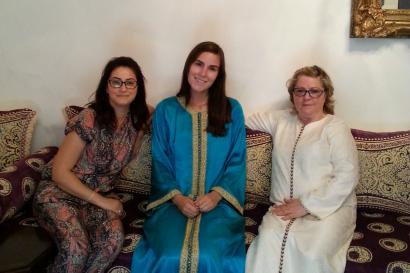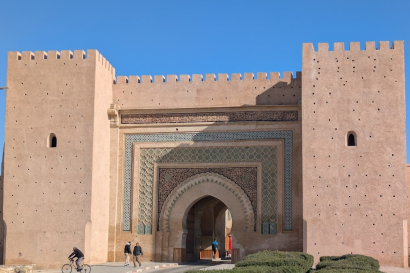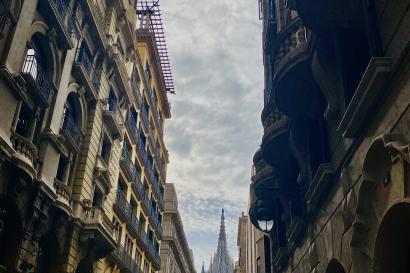
Before I came to Morocco, many people expressed their concerns to me that living in Morocco as a women would be “challenging” and at times, “a bit scary.” I obsessed over what would be appropriate to wear. My Google searches offered little comfort: the information ranged from “you can wear shorts and tank tops!” to “try not to show your wrists and ankles.” The term “dress modestly” was ambiguous to me. After all, what’s modest in the States might not be appropriate on the streets of Rabat. I packed as many long skirts, loose fitting pants, lightweight scarves, tunics and crew neck t-shirts as I could and hoped for the best.
Now that I’m here, I think that my worries about my clothes were a bit unnecessary. In general, it is best to cover the knees with a maxi skirt or long pants. However, it really isn’t necessary to wear a long sleeved shirt. I wear t-shirts (not tight, but not completely baggy) and have never felt inappropriately dressed. Many girls on my program wore jeans and capris that fit more tightly than the things I brought and never had issues. For those of you reading this and thinking about studying in Morocco, here’s the best advice that I can give: in the summer, it’s hot, so pack lightweight long skirts and pants. T-shirts are completely fine as long as they’re not skin tight. If you want to wear tank tops when you’re in class, just being a lightweight cardigan or scarf to cover your shoulders in the streets. No one expects that you cover your head when outside: not all Moroccan women do! However, this is based off of my experience in a metropolitan area. If you’re studying in rural Morocco, err on the side of being more conservative than what I recommend here.
Street harassment was another concern that many people drew to my attention before I came to Morocco. People warned me that I would be constantly catcalled and need to be accompanied by a man in the streets. They warned that if my head were not covered, I would be inviting extreme harassment. I, however, did not find this to be the case. Men do say things on the streets, but they yell things like “Welcome! Welcome!” and “hello, beautiful girl!” Compared to the vulgar things American men say to women on streets, I did not find these things to be all that bad. Unlike in the States, the men never followed me or tried to touch me. I also found that it did not matter if my head were covered or not. Fully covered Moroccans women got just as many “Zwinas! (Beautifuls!)” as I did. Overall, I think people greatly exaggerated the “street harassment.” I think that as long as you dress in a culturally appropriate way (e.g. no short-shorts and crop tops), you shouldn’t feel too uncomfortable in your daily life in Morocco.
While being a woman in Morocco is different than being a woman in the United States, I generally felt very safe and comfortable in the streets. I even joined a gym during my time here and had no problem working out alongside Moroccan men. For other girls thinking about visiting Morocco but are hesitant because of the cultural differences for women, please don’t let that stop you. Experiencing Morocco as a woman made my experience all the more unique, challenging and helping me grow in ways that I never would have if I had stayed at home in my comfort zone.

Chloe Zagrodzky
<p>Chloe Zagrodzky is a rising junior at Claremont McKenna College majoring in Government and Leadership. When not reading the Federalist Papers for the 100th time, she can be found practicing her French skills, running or preparing to compete with her Mock Trial team. Her list of favorite things includes dogs of all shapes and sizes, reasonably priced mochas and creative Instagram captions.</p>









